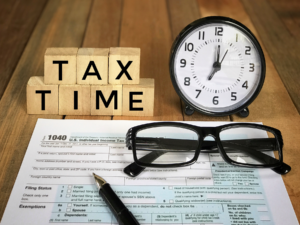The End of Tax Season, Or Is It?
April 22, 2022
To Inform:

Like a spring morning rejoicing in the retreat of winter, we rejoice in the recent close of so-called “tax-season”. This past Tuesday, tax off-season began for most people. For financial professionals, especially CPAs, tax off-season is at best fleeting and at worst non-existent, much like springtime in our home state.
Most folks, though, once the filing deadline has passed and refunds or payments are complete, can enjoy the warmth of spring, summer, and fall without thinking about taxes again. While that sounds attractive, it can be helpful to consider tax-planning issues year-round to help make what we typically think of as tax-season a little less bitter.
Here are a few things to think about:
Tax withholding
- If you owed taxes or got a large refund for the prior year, you might consider adjusting your tax-withholding amounts on your wages, IRA distributions, or other forms of income. For workers, this can apply not only to federal and state, but also local and school district taxes as well. Getting a refund can be exciting, but who would you rather hold your money throughout the year, you or the government?
Charitable Giving
- Taxes too high? For those who itemize their deductions, a good way to reduce taxable income is to give more to charity. There are vehicles for “charitable lumping” such as Donor-Advised Funds that allow a charitably-inclined taxpayer to pre-fund some of their future giving for the sake of getting a larger deduction now or in a year when income may be high. This is a big “talk to your advisor” point.
Required Minimum Distributions & Qualified Charitable Distributions
- If you have Required Minimum Distributions from your IRA or your Inherited IRA, you are able to withdraw those funds at any time in the calendar year. This also applies to charitable giving from IRAs after age 70.5, known as Qualified Charitable Distributions. Waiting until year-end may allow for some potential growth in the account if the market is going up, but waiting too long may cause timing issues at year-end.
Traditional or Roth IRA Contributions/Conversions
- History tells us that getting money invested earlier allows for more compounding growth, so get your Traditional IRA or Roth IRA contributions in there! You need to be certain that your income by year-end will not exceed the limits allowing you to contribute to these account types, but if that’s not in question, you may contribute early in the year or on a monthly basis.
- Roth conversions are usually done later in the year when an accurate income estimate can be determined for the year, but for those with predictable income, these conversions can be done earlier as well.
Back-Door Roth IRA Contributions
- If you are able to do back-door Roth contributions, it can pay to do those earlier in the year for the same reason as the last point. The longer dollars are invested in a tax-advantaged way, the better. More details on this here.
This list is not exhaustive and there are many nuances surrounding the aforementioned strategies, so please consult your financial advisor and your tax-preparer to make sure that you stay within the rules and are employing the best strategies for your situation.
If you communicate your goals with your trusted financial professionals, you don’t have to be stuck cramming all of your tax planning into tax-season proper, because tax-season really never ends.
 Written by Nick Boyden, Client Advisor
Written by Nick Boyden, Client Advisor